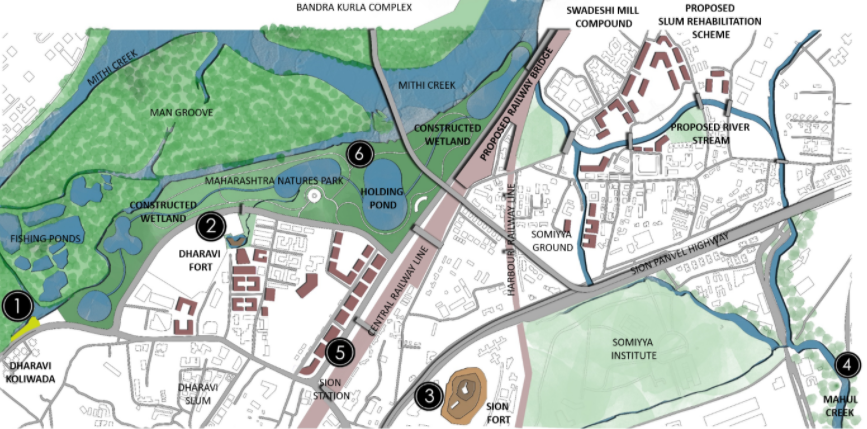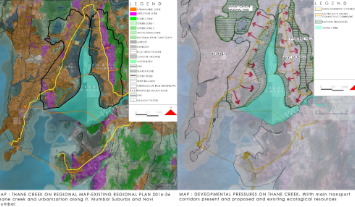
Re – negotiating lost edge of Mumbai ‘s Mithi river.
In India, historically water was an utmost significant resource for the communities as their religious, social & economical activities were truly dependent on the banks of a river. Ghats along the rivers were expressions of both social and cultural richness of cities. Whereas some cities, palaces, forts, and capitals were planned along river banks. Most of these cities could develop a distinct identity with the river, guided by geography, climate, local resources & history. Through time and transformation, the traditional riverscape and its inherent Indianness gradually faded away. The Identities of vibrant cities were lost to misplaced aspiration and imported perceptions.
Similar in the case of Mumbai, rapid urbanisation and haphazard growth has completely transformed the natural landscape which once consisted of hills, forests, riverine systems, creeks, and mangroves.

Post industrialization, urban restructuring of Mumbai has increased the pace of development and added physical pressure on the city’s natural resources in order to create more residential and commercial units in a limited landmass. Mumbai’s riverine systems were at receiving end under the veil of such development, so much so that re-claiming ecologically sensitive land, for short term financial gain, has been the trend in Mumbai for past sixty years.
Decay of a Riverine Ecology:
Historically, river Mithi was Mumbai’s prominent edge defining Island city and Salsette Islands. The river had played a various roles for multiple generations of the city dwellers, starting from using the river as a transport system or defense mechanism in pre-colonial times, to the river as a part of the city’s water supply chain in modern times. Besides, fishing in the estuarine region of the river was a source of livelihood for communities. The estuarine region was a global landmark for avian & wildlife enthusiasts, and additionally the river was a great advantage for the city considering natural topography based drainage system.
But in recent years, rapid urbanization and ever-increasing dominance of built spaces are threatening these natural systems that once played a vital role in deciding the form of the city. The edges of the river are constantly shrinking which indeed affects the ecology of the riverine system, including birdlife and fisheries in the creek. Negligent reclamation has created low lying areas in the city that are vulnerable to waterlogging even during low rainfall periods. Further, it also harms the context of the city’s urban artefacts including its heritage and aboriginal communities.The current scenario, land use, and development pattern of the city, continues to show a strong degree of anthropocentrism with a focus on economic and infrastructure development undermining important ecological processes and destroying the natural environment. This misplaced aspiration for development has caused many tangible & intangible issues with respect to the relationship between the river and the city.
- Loss of marine and aquatic life (biodiversity) along the coast of the city.
- Loss of socio-cultural connection with riverine systems.
- Frequent urban flooding and waterlogging in the landward side of the city during monsoon season.
- Loss of identity and historic context.
My Vision for Mumbai’s Green Recovery:
A. Riverine systems to be recognized as a prominent edge expressing the co-existence of man and nature.
- Integration of communities with urban nature.
- Formation of ecological and mobility networks forming diverse public realms.
- Restoring the historical context of the city.
- Taking urban nature into the city’s visible spectrum.
- Restore values and use of the riverine system.

B. City-level design strategies:
- Re-designing dense eco-sensitive areas which will be converted into constructed wetlands which will purify a certain amount of the city’s storm water and also act as a holding pond during heavy rainfalls. Further wetlands will be helpful to restore animal and fish life into the creek.
- Lateral connection of river streams will divert excess floodwater from Mithi and will also act as a surplus water retention tank. This will further improve groundwater permeability, in addition to that lateral connection will open out access to the eastern waterfront from the west edge of Mumbai through Mithi river.

C. Neighbourhood level design strategies:
- A pedestrian network connecting existing and new public space along the creek edge creating a diverse public realm will be helpful to engage people to the river edge and will ensure a larger reach to the river.
Conclusively, reviving a river and its ecology is a time and cost inductive task as it involves various stakeholders, perspectives, and biases, but few small initiatives to create an expression of co-existence of man and nature is currently the need of the hour for Mumbai.
For Mumbai Matters:
Name: Aniruddha Madav
Organization: Former student of School of Planning and Architecture, Bhopal
Aniruddha is a young architect and urban designer from Mumbai. His interest lies in understanding cities through various lenses with a focus on the relationship between nature and city.

Waatavaran Climate Environment & Sustainability Foundation is a not-for-profit company incorporated and registered under Section 8 of the Companies Act, 2013. All donations made to Waatavaran are eligible for income tax deduction under Section 80G of the Income Tax Act.
Contact Us
REGISTERED ADDRESS
L-4/906, Swapnapurti, Sector 36, Kharghar, Navi Mumbai – 410210, Maharashtra, India
OFFICE ADDRESS
59/A, 1st Floor,
Kamgar Nagar Road,
Near Shetty Infra Services,
Kurla East,
Mumbai, Maharashtra – 400070
Email: [email protected]
Mobile: +91-8850903025 / +91-9221250399
Copyright © 2022 | Site By: Creatiwitty


